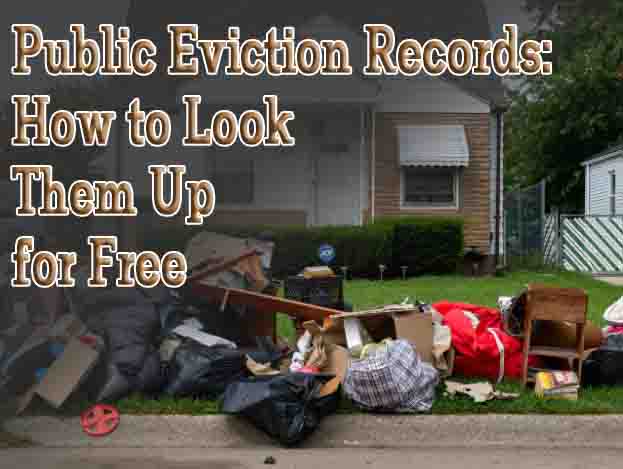Eviction records are important to know if you’re a landlord or if you’re looking to rent/buy housing. These records follow someone for a long time and reflect the number of times someone has been evicted from a property.
Table of Contents
What Is an Eviction?
An eviction occurs when someone is removed from an apartment or home because they don’t pay rent. Failure to pay rent leads to warnings and eventually eviction when the outstanding debt becomes too severe.
Every state has unique laws about eviction, but it’s something that occurs in all 50 states. Also, some changes happened during the Covid-19 pandemic that changed the way eviction occurred from 2020 to 2022.
What Are Eviction Records?
Eviction records are records about eviction. When someone is evicted from a home, they have to go to court. The proceeds from the court case are known as eviction records. These records are easy to access when you know where to look.
Eviction records will include the reason for eviction, balances owed to the landlord, the date of eviction, and much more. They’re detailed records.
Are Eviction Records Public Records?
Yes, eviction records are public records. The proceeds of court cases about eviction are filed with the courts and available for the public to see. Background checks will also reveal eviction records.
It’s legal to ask tenants about evictions in most states (aside from New York and Washington). However, there are exceptions, and eviction records are typically accessible in all 50 states.
Are Evictions on Credit Reports?
Yes, evictions appear on credit reports. The eviction proceeds don’t end up on the credit report, but the outstanding debt does. Debt appears on a credit report because the past-due rent is sent to a collections agency. This agency reports the delinquent account to credit agencies, and this gets reflected on your credit report.
In some cases, evictions may lead to bankruptcy, and this will also appear on your credit report.
How to Find Public Eviction Records
Several methods are available to help you find eviction records. Unfortunately, some will waste your time or give you an unreliable answer. The good news is that public records lookup tools like Information.com are perfect for finding public eviction records for free.
We’ll take you through a handful of the best options below.
1. Information.com
When it comes to searching for information about an individual, address, or phone number, Information.com has you covered. Not only will you find eviction information about someone when you use the public records lookup tool, but you’ll also find additional information about them, like their contact info and past addresses.
When it comes to eviction records, Information.com is also the best in the business. With access to thousands of public records, Information.com brings you the answers you’re looking for almost instantly. Additionally, information found with Information.com is always relevant, up-to-date, and helpful.
Some examples of information you’ll learn with Information.com include:
- Eviction records
- Someone’s address
- An individual’s full name
- Family information
- Phone number
- Email addresses
- Alternate addresses
- Sex offender status
- Criminal record
- Traffic violations
- Credit history (in some cases – bankruptcy)
Overall, when it comes to finding information about a property of a person, Information.com is one of the best choices. Plus, you’ll find much more than eviction records.
2. Ask the Tenant
Asking a tenant about their eviction records is another great way to learn more about an eviction. Honest tenants will tell you about the eviction and provide the necessary documents that confirm their case. It’s also possible to request this information as part of a background check before letting the tenant rent an apartment.
On the other hand, some tenants may lie. In states where you can’t look into someone’s eviction records, like New York, this becomes a liability. When people aren’t honest about their past, it leaves you open to the possibility of being blindsided.
3. Searching Through Court Records
Evictions are something that occurs within a court of law. Therefore, people must enter into court proceedings for a verdict to be reached. While some evictions are settled outside of court, the majority of cases go to court to provide protections for landlords and tenants.
The benefit of eviction cases going to court is that the proceedings of the case are public records. Therefore, you can visit the County Clerk’s office or Court Office in the county where the eviction occurred. You can call, visit in person, or even search online through the county’s database.
Some counties don’t have databases and some evictions are handled outside of court, so this is not always a reliable method.
Why It’s Important to View Eviction Records
Eviction records are important documents to look into. When a tenant wants to live within a rental property, knowing their history helps landlords make the right decision about renting to them. That said, there are a few reasons to consider someone’s eviction records. We list these reasons below:
- Credit history and a story that doesn’t appear on credit reports
- Lets you learn more about someone’s character
- Insight into where someone used to live and why they left
- Details about a tenant you might not find within a standard background check
Depending on your reasons, looking up eviction records can make or break a tenant’s chances of living on your property. Therefore, the main purpose of looking into eviction records is to protect yourself as a renter.
Why Tenants Need to Consider Eviction Records
Landlords typically view eviction records more than tenants. Still, that doesn’t mean tenants shouldn’t view eviction records. Landlords that have a history of evicting a lot of tenants are a red flag from a renting perspective.
We still recommend asking the landlord about why evictions were necessary before making judgments.
Find Eviction Records for Free
Eviction records are useful for a few reasons. First and foremost, they let you know if a tenant has a good credit history with another landlord. Evictions are often a red flag, but we still recommend asking tenants about their evictions before ruling them out. In some cases, evictions may have occurred during the Covid-19 Pandemic or in an otherwise unfair way.
Also, before searching for someone’s eviction records make sure you have the authority to do so. States like New York don’t let you look into someone’s eviction records without special permission. This also applies in Washington.

